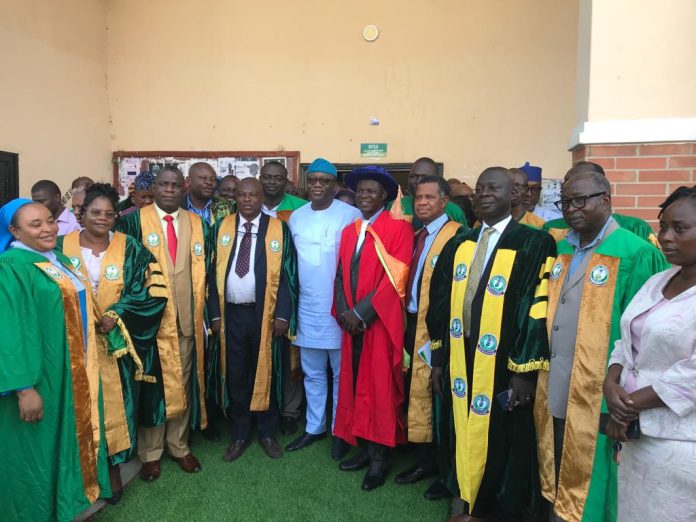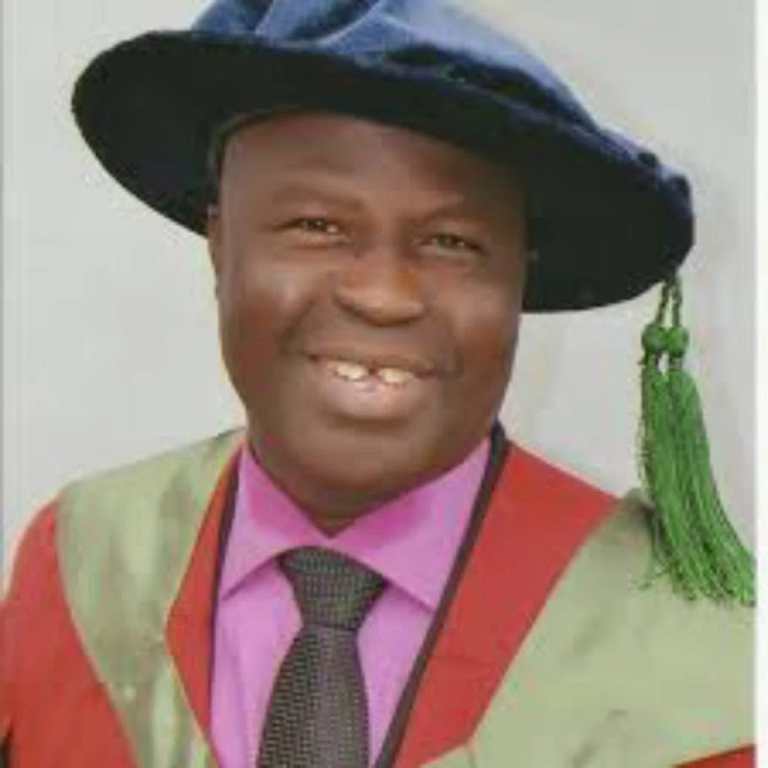- By Demola Atobaba, Ado-Ekiti
Stakeholders in education sector which includes a Professor of Political Science of the Federal University Oye-Ekiti (FUOYE), Prof. Azeez Olaniyan and former Governor of Ekiti State, Dr. Kayode Fayemi have proffered solutions to the problem posed by the ghost of separatism unarguably haunting the Nigerian nation, and causing disharmony and perennial violence among the ethnic nationalities. The duo gave the antidote to the problem at the 11th inaugural lecture of the University which held on Tuesday, August 15, 2023 at the large lecture theatre of the faculty of science.
The lecture was organized by the University Ceremonial Committee chaired by Prof. Tajudeen Bolanle Opoola who doubles as Deputy Vice-Chancellor, Administration, and held brief for the Vice-Chancellor, Prof. Abayomi Sunday Fasina, to host the guests and pronounce the inaugural lecturer as full professor.

While Prof. Olaniyan sounded skeptical about the possibility of surviving the recurrent separating tendencies of Nigeria, Dr. Fayemi expressed optimism as he opined that nation building is a work in progress in the context of Nigeria.
Ex-governor Fayemi who had honoured the Inaugural lecturer and the University with his presence at the occasion, and was warmly received by the FUOYE community as well as other dignitaries who graced the occasion who included several monarchs from Ekiti, relatives, friends, colleagues and well wishers and the Reverend Father of Ekiti Catholic Church, Mr. Felix Ajakaiye, congratulated Prof. Olaniyan for attaining the peak of his academic career with the presentation of the inaugural lecture as required by the academic traditions.
Dr. Fayemi contributed to the intellectual discourse on the country’s socio-political challenges, as offered by Prof. Olaniyan, one of which is the separating tendencies of Nigeria, saying: “First of all, l congratulate the inaugural lecturer. He is someone I am immensely proud of. Nation building is a continuous work, it is always a work in progress and l think that is the conclusion we can all draw from the inaugural lecture. We are not always going to be haunted by the ghost of separatism when we would finally overcome the challenges of division and realize the dreams of our nation. We are on that journey, it is a journey, not a destination, and we would get there.”
In his clinical x-ray of the Nigeria’s political challenges, Prof. Olaniyan singled out what he termed , “the ghost of separatism” haunting the country since its inception by the amalgamation in 1914 by foreign colonial powers represented by Frederick Lord Lugard. He argued that the failure to allow “… a shred of inputs by the inhabitants” of the entity called Nigeria before the amalgamation rendered such exercise to a somewhat forceful congregation of strange bedfellows!.
According to Prof. Olaniyan, in his inaugural lecture entitled : “Nigeria and the undying spirit of separatism”, Nigeria’s separating tendencies are deeply rooted in the foregoing anomaly.
Starting on a clear note of x-traying the nation’s recurrent political quagmires, Prof. Olaniyan said: “l am here to give a reflection on a national issue that has dogged the evolution and operation of the Nigerian state from inception, which fall squarely within my line of academic research.”
He continued with an intellectual definition of a state, citing three kinds of state, namely, a strong state, a weak/soft state and a failing or failed state. The lecturer classified Nigeria as neither failed nor failing, saying: “Mr. Vice-Chancellor Sir, in this above categorization, where do we locate Nigeria? In political science discourse, the place of Nigeria is still a matter of debate. Some people would place it is in the weak or soft category while some project failing status, and in the extreme, a failed one. My position is that just as there is a difference between dying and dead, also there is a difference between failing and failed. Perhaps , we are all sitting here today because Nigeria has not totally failed. Of course, Nigeria is out of the strong state club. It is in the league of the weak or soft with its feet dangling dangerously at the precipice of a free fall.”
Prof. Olaniyan further explored the concept of a state and that of separatism to further drive home his points, noting strongly that four major factors co-exist to produce a state, hence he opined that:” Mr. Vice-Chancellor sir, from the foregoing, four major facts about the state have come to hold relief. One, states. except for a few cases, are products of force. Two, they are an agglomeration of different groups. Three, these disparate groups were forcefully cobbled together by superior forces and maintained by such. Four, implanted within the nation-state are the two forces of convergence and divergence. In other words, all state possesses, in varying measures, unifying, and separating tendencies. This means, right from inception, the nation-state system has been under the constant threats of centripetal and centrifugal forces…”
The astute professor of political science proceeded to give instances of the separating tendencies of Nigeria as orchestrated by Nigerians by citing several secessionist moves including the 1950’s threat of secession by the Emir of Zaria if half of the total seats for the House of Assembly was not given to the northern region, the 1953 attempt by Northern leaders to declare secession following the humiliation of its delegates in Lagos during the debate for independence, the 1964 threat of secession issued by Micheal Okpara, then Premier of the Eastern region, in response to allegations of intimidation and election rigging, the January 15, 1966 coup that led to the death of millions of Nigerians, mostly Igbo, Isaac Jasper Adaka Boro’s declaration of the Republic of Niger Delta in 1966, and more recent Boko Haram insurgence , the Indigenous People of Biafra’s agitation which got to its peak in 2015 and the declaration of Oodua People’s Republic among others.
He justified the inevitability of the separating tendencies by equally citing a 1970 piece of Prof. Tekena Tamuno which argued that separatist agitation in Nigeria started from the year of amalgamation in 1914 and quoted the academic as saying :” …and they are buoyed by six powerful factors; (1) Heterogeneous ethnic compositions; (2) cultural diversity; (3) vast size; (4) varied administrative practices; (5) controversial political and constitutional arrangements and )6) absence of a strong ideological magnet”.
In his further quest to put the chaotic political situation of the country into proper perspective, Prof. Olaniyan identified other factors igniting the separating tendencies as uneven resource control, fear of domination by minorities, uneven level of development between the north and south, ungoverned spaces, State fragility and growing insecurity as well as leadership failure. He went down memory lane to review instances of failed leadership as offered by past Nigerian leaders. These according to him, included the accidental leadership of Tafawa Balewa, the circumstantial but short-lived leadership of Aguiyi Ironsi, also circumstantial and naive leadership of Yakubu Gowon, the charismatic but also short-lived tenure of Muritala Muhammed, Sheu Shagari’s wasteful ruling which led to the coup that brought in Muhammadu Buhari’s first tenure of harsh leadership style, which equally led to the maradonic Ibrahim Babangida’s reign of corruption that foisted Sani Abacha’s murderous leadership on Nigeria before interventions of inconsequential leadership of Earnest Shonekan and the peace loving General Abdulsalami Abubakar’s brief reign leading to Olusegun Obasanjo’s child of grace ruling, the unfortunate Umaru Yar’Adua and the fortunate but weak-minded Goodluck Ebele Jonathan who returned power to the harsh and uncaring Muhammadu Buhari who gave the Nigerian academia its worst nightmare.
As a way-forward, Prof. Olaniyan who currently holds the deanship positron of FUOYE’s faculty of Social Sciences, proffered solutions such as restructuring, state responsiveness, upholding the principles of inclusion, equity and justice and leadership recruitment among others to solving Nigeria’s problem of separating tendencies. He gave his conclusive remarks thus:” Mr. Vice-Chancellor sir, let me conclude this lecture by connecting to my theoretical configuration mentioned earlier; the two forces of centrifugal and centripetal are almost at equilibrium in Nigeria. This explains the presence of tension in the land. It explains why separation is a big task to accomplish…the forces that are pushing Nigeria apart and those that seek to pull it together are almost of equal capacity. Such factors as ethnicity, regionalism, state capacity, long military rule constitute the centrifugal forces. These are what trigger the counter-coups, civil war, inter-religious conflagration, brazen annulment of national elections and exclusion, which in turn fuel the spirit of separatism.
However, these are being counterpoised by history and long social interactions among the Nigerian people and vigilance imposed on one another, particularly by the, “big three”-Hausa/Fulani, Yoruba and Igbo ethnic groups…neither of the two forces -centripetal and centrifugal-has been able to overwhelm the other. The day one succeeds, we will either have a collapse of the state or enjoy an enduring peace. As it is, Nigeria hangs in the balance . It is neither falling nor standing well.“
Sounding more skeptical, Prof. Olaniyan observed that the political elite seems to benefit from the status quo as a collapsed Nigeria would not be of any use for them to plunder while a united and strong Nigeria would incapacitate them. He lamented that peace, development and stability would elude Nigeria if it remains on a currently “shaking rope” and tasked the leaders to fear the people rather than fearing God, urging Nigerians to cultivate themselves in such a way for their leaders to fear them.




